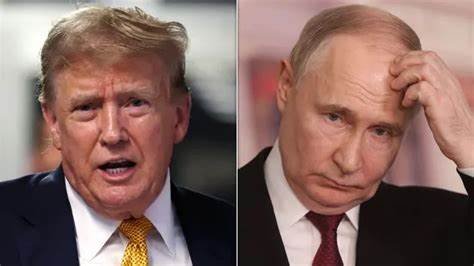The Kremlin has downplayed recent threats by former U.S. President Donald Trump to impose new sanctions and tariffs on Russia, labeling them as neither novel nor unexpected. Speaking on Thursday, Kremlin spokesman Dmitry Peskov addressed Trump’s comments, which suggested that failure to end the ongoing war in Ukraine would result in severe economic penalties against Russia.
Trump, in remarks delivered on Wednesday, stated that if a resolution to the Ukraine conflict was not achieved, he would have “no other choice” but to impose “high levels of Taxes, Tariffs, and Sanctions” on goods sold by Russia to the United States and other participating countries. He framed the move as not only a punitive measure but also a form of tough love, claiming it would ultimately benefit Russia by pressuring it to conclude what he described as “this ridiculous war.”
The former president further asserted that ending the conflict would be “a very big favour” to Russian President Vladimir Putin, warning that the war is “destroying” Russia from within. These comments followed Trump’s earlier declaration of intent to speak with Putin directly in an effort to address the ongoing crisis.
In response, Peskov dismissed the significance of Trump’s remarks, pointing to the former president’s track record of applying economic pressure on Russia during his first term in office. “We do not see any particularly new elements here,” Peskov remarked. “He likes these methods, at least he liked them during his first presidency.”
Peskov also emphasized that Moscow is keeping a close watch on all of Trump’s statements, noting that the Kremlin is “carefully recording all the nuances” of his rhetoric. Despite the latest threats, he reiterated that Russia remains open to constructive engagement with the United States. “We remain ready for dialogue,” Peskov stated, adding that President Putin has consistently advocated for “equal and mutually respectful dialogue.”
Trump’s comments come amid mounting international pressure on Russia to de-escalate the conflict in Ukraine, which has strained Moscow’s relations with Western nations. Since the war’s onset, Russia has faced a series of sanctions and diplomatic isolations, creating significant economic and political challenges for the Kremlin.
While Trump’s warning marks a continuation of the hardline stance he took on Russia during his presidency, it has drawn mixed reactions from global observers. Some see it as a calculated move to appeal to his domestic base, while others question the efficacy of sanctions in compelling Russia to change its course.
Peskov, for his part, reiterated that Moscow is awaiting tangible signals from Washington before any substantial dialogue can take place. He emphasized that while Russia is prepared to engage in discussions, it would do so only on the basis of equality and mutual respect.
The geopolitical backdrop remains fraught with tension, as the conflict in Ukraine shows no signs of abating. Trump’s comments, though largely dismissed by Moscow, serve as a reminder of the growing divide between Russia and the West over the issue. For now, the Kremlin appears to be adopting a wait-and-see approach, monitoring developments closely while signaling its willingness to negotiate under the right conditions.
The international community continues to grapple with the fallout from the Ukraine war, with economic sanctions, military aid, and diplomatic initiatives all playing a role in shaping the evolving narrative. As leaders like Trump weigh in, the global stakes remain high, and the path to resolution uncertain.



